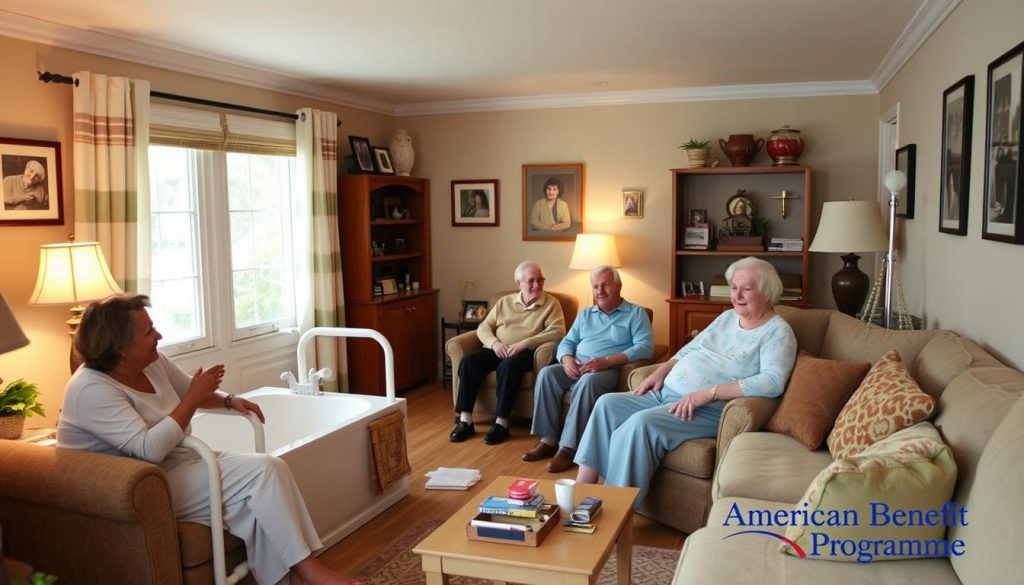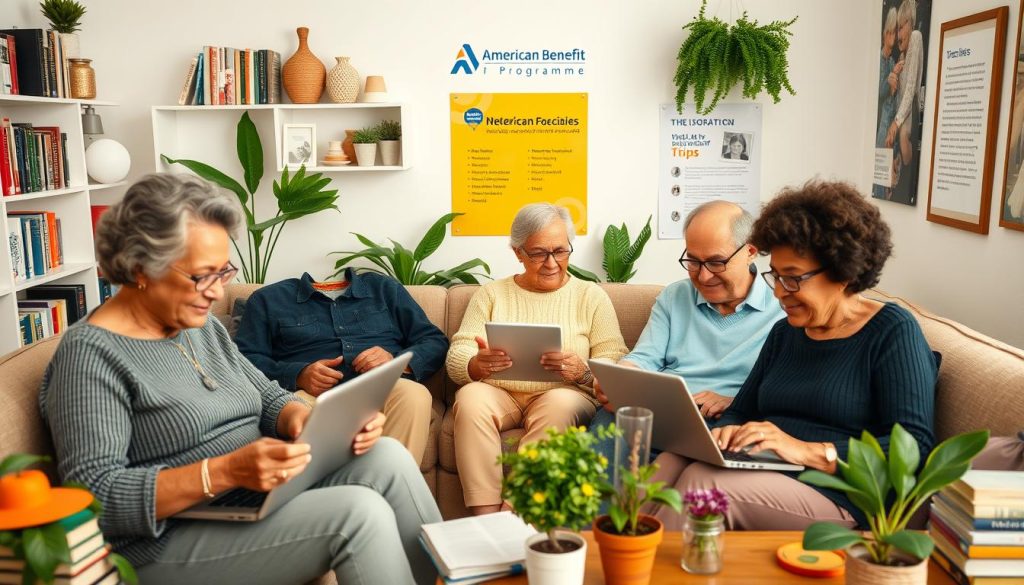Have you thought about how the right help can give seniors freedom? It’s key to grasp the value of empowering resources for the elderly. They help seniors live rewarding lives with more freedom. This guide showcases the wide help available for them.
Data shows how these resources are critical. For example, Meals on Wheels fights loneliness and hunger with healthy meals1. The National Council on Aging (NCOA) offers great support too. They provide aid on benefits and health for those 60 and older1. It’s key to have social activities, exercise, and tailored care to boost independence2.
This guide reveals how empowering seniors betters their mental and physical health. It also helps them connect more with others2. We’ll look at how to support seniors in gaining freedom and happiness. This is especially true in National Senior Independence Month, which raises awareness on this topic3.
Key Takeaways
- Empowerment resources significantly enhance seniors’ independence.
- Programs like Meals on Wheels address nutrition and loneliness.
- The NCOA offers vital support for aging adults.
- Encouraging physical activity boosts seniors’ overall health.
- Social engagement is crucial for emotional well-being.
- Right Accord provides personalized care to foster independence.
- February is recognized as National Senior Independence Month.
The Importance of Senior Empowerment
Helping seniors feel strong and independent improves their lives. It’s key to help them make their own choices. As people get older, they face things that make living on their own hard. This can affect their happiness and health.
Understanding Autonomy in Aging
Being able to decide for themselves is very important for seniors. Many deal with not being able to move well and sicknesses like arthritis and diabetes. These problems make it hard to live alone4. Still, many want to stay in their homes. It’s vital we provide services that help them do this and meet their needs5. Having friends and taking part in community events are also key. They help older folks feel less lonely and keep their minds healthy4. Offering the right help lets seniors look after their health better.
The Role of Empowerment in Well-Being
Feeling empowered really helps seniors feel better overall. Making their own choices boosts their confidence and happiness. This has a big effect on how they feel inside. Doing gentle exercises and brain games can keep their minds sharp4. Groups and clubs for older people are super important. They make sure seniors get the support they need for a healthier life5.
Senior Empowerment Resources
Finding the right help is key for seniors to stay independent. There are many groups and programs just for older folks. They help seniors live better and get the support they need.
Categories of Resources Available
We have different kinds of help for seniors, such as:
- Senior Assistance Programs: These programs offer vital support services for daily living, health care, and economic security.
- Advocacy Groups: Groups like the American Society on Aging tackle big issues. They deal with ageism, economic security, and health well-being6.
- Online Resources: A directory with lots of services helps seniors find important information.
How to Access Senior Empowerment Resources
Seniors can find these helpful resources in many places. They can look online, or ask local volunteer groups. For example, the United States Administration on Aging helps seniors. They provide important services6. Empowered Aging helps around the Bay Area. They have volunteers who support at-risk folks7. Also, the Caregiver Action Network helps improve life for those caring for loved ones6. Seniors can search online or reach out to local groups for help.
Promoting Self-Care for Seniors
Self-care is key for seniors to feel independent. Daily routines help them stay self-reliant, happy, and healthy. By grooming, working out, and handling meds, they live better. This helps them do well in their communities.
Encouraging Daily Self-Care Routines
Daily self-care is good for body and mind. Seniors with solid self-care habits face fewer health problems and handle existing ones better8. Being social or doing meaningful work boosts their independence and joy8. Simple activities like dancing enhance balance and activity levels8.
Benefits of Self-Care on Independence
Self-care boosts physical and mental health. Hanging out with pals and joining in group fun makes seniors feel more free and self-directing8. Eating well – think whole grains, fruits, and lean meats – keeps their energy up and cuts illness risks9. Gardening and audiobooks improve mental health and offer important interactions8/9.
| Self-Care Activities | Physical Benefits | Mental Benefits |
|---|---|---|
| Dancing | Improves balance and coordination | Enhances mood and social connection |
| Gardening | Promotes physical activity | Reduces stress and fosters community ties |
| Social Engagement | Reduces risks of chronic illnesses | Boosts feelings of freedom and autonomy |
| Audiobooks | Stimulates cognitive functions | Encourages engagement with new ideas |
Self-care is crucial for seniors’ freedom and life quality8.
Encouraging Decision-Making Among Seniors
Helping seniors make their own choices is key to their freedom. By letting them choose big and small things, they feel in control. This not only makes daily life better but also helps their well-being.
Fostering Autonomy Through Choices
Decision-making boosts seniors’ independence. Getting them involved in their care plans meets their needs. This approach is part of successful community care10. Also, workshops teach them about health and care, helping them decide wisely11.
The Psychological Benefits of Decision-Making
Making choices helps seniors feel valued, which is great for mental health. Being part of decisions improves their mood and lessens loneliness. Sharing choices also builds social ties, key for a happy life10. Thus, decision-making leads to better health management10.
Active Participation in Daily Activities
Getting seniors involved in daily tasks is key to their independence. Doing household chores improves their sense of responsibility. It also boosts their self-esteem and health. Letting them help with setting the table, gardening, or cleaning makes them feel useful. This is important for their emotional well-being.
Integrating Seniors in Household Tasks
Letting seniors help with home chores connects them to where they live. Studies show planned activities boost physical, mental, social, and creative skills. They help seniors stay independent. Making activities personal can greatly increase how often residents take part12. A nice, bright place for activities can get a lot more residents interested12. When residents make friends, they’re more likely to join in regularly. This shows how key social connections are12.
Benefits of Social Engagement for Seniors
Socializing is key for seniors to stay sharp and avoid feeling lonely. Family activities motivate residents by 15% more12. Letting the community know about events can boost attendance by 20%12. Social activities fight loneliness and improve emotional health. Updating programs based on what residents need can keep participation growing each year by 5-10%1213.
Modifying Home Environments for Independence
The home setting is key for the independence of older people. making changes can cut the risk of falls, a big hazard for them14. Simple changes help make living spaces safer and more comfortable.
Importance of Safety Modifications
Making changes at home is vital to keep seniors independent. Adding grab bars, ramps, and more light can help avoid falls14. Changes like walk-in showers and higher toilet seats make the bathroom safer. Higher toilets help with posture and are easier on joints. Lowering countertops helps those with less mobility do everyday tasks14.
Practical Tips for Home Modifications
Here are some tips to make homes safer and easier to get around:
- Put grab bars in key spots like bathrooms. This costs $100 to $50015.
- Choose walk-in showers over tubs. They’re safer and cost $10,000 to $12,00015.
- Make doorways wider for walkers or wheelchairs. This costs $700 to $2,500 per doorway15.
- Add lever faucets in kitchens for easier use. This helps those with arthritis.
- Think about the cost of wheelchair ramps. They range from $950 to $3,00015.
These changes help seniors live safely and comfortably. For more on home changes, check out resources for senior citizens.

Utilizing Assistive Devices
Assistive devices are key in helping seniors live freely. They include aids for moving around to tech for daily tasks. With these tools and senior programs, older people can do their daily activities more safely.
Types of Assistive Devices for Daily Living
Seniors have many devices designed for their needs:
- Mobility Aids: Canes, walkers, and wheelchairs help a lot in preventing falls16.
- Medication Management Devices: These help seniors take medicine on time, cutting down missed doses by 75%16.
- Health Monitoring Devices: These help manage long-term health issues, improving user health by 60%16.
- Communication Devices: They lower loneliness by half, keeping seniors in touch with friends16.
- Smart Home Devices: These lower accidents at home by 40%16.
- Personal Emergency Response Systems (PERS): They make emergency help arrive 70% faster16.
Overcoming Resistance to Assistive Technology
Sometimes seniors doubt tech because of wrong ideas or bad past experiences. Teaching them about tech benefits helps a lot. Like, brain games boosted memory and focus by 30%. It proves tech can help the mind stay sharp.
Using tablets increased interest in new things by 45%. It helps seniors learn about the world. We should also tell them about places that offer free tech help. This support is key for their independent living.
Creating a Supportive Environment for Seniors
It’s important to make a supportive place for seniors. This helps them get help while staying independent. We aim to create an environment where older people can thrive at their own speed. Families and caregivers play a big role. They help seniors keep dignity and self-reliance.
Balancing Support and Independence
Good support for seniors means seeing what they can do and helping them when needed. About 25% of older Americans are not very active. This shows how key it is for them to move more17. Being involved in daily activities boosts their health and mind. Programs aimed at seniors offer help and encourage them to live an active life.
Emotional Support as a Foundation for Independence
Emotional support is very important for seniors to feel independent. Sadly, 17% of them feel alone, which hurts their mental and emotional health17. Programs that help them make friends are very important18. Talking openly, being understanding, and community services are crucial. They help seniors share their needs and wishes, which keeps them independent.
Engaging Senior Support Organizations
It’s very important for the happiness of elders to connect with senior support groups. These groups help seniors get to the resources and help they need. They make sure seniors are part of their community and feel important.
Finding Local Senior Advocacy Groups
Seniors should look for local groups that stand up for their rights and offer help. These groups understand what seniors need because of age, like help with moving around or feeling sad. The National Council on Aging (NCOA) knows of over 11,000 places where seniors can go every day19. Such places help seniors find out about health, money, and programs just for them.
Utilizing Senior Assistance Programs
Senior programs are important because they help elders live on their own. Some programs focus on staying healthy, and others help with memory problems20. Senior centers also have activities that bring young people and elders together19. Eating right is important too, and there are groups that help with that21. Using these services helps seniors stay fit and make new friends21 and20.
Online Resources for the Elderly
Today’s technology helps seniors feel more connected. It fights loneliness by offering many online tools. Platforms like social media and video calls help them keep in touch. They also find online places that boost their sense of power and community involvement.
How Technology Can Enhance Connectivity
More seniors are using tech today. It helps them feel happier. They can talk to family and find groups that share their hobbies. Tools online help them know about events and activities. This makes sure they feel part of something, giving emotional support and independence.
Online Educational Opportunities for Seniors
Seniors have many chances to learn online. They can study things like art or tech. Groups offer webinars and classes to help them with digital skills. This lets them try new hobbies and ideas.
Many websites help seniors learn how to use the internet better. This makes learning easier and more useful. With help, seniors can improve their lives a lot.

Conclusion
Helping older adults feel powerful is important for a good life. The number of seniors is rising. Many have disabilities. There are many helpers out there for them. This includes care for themselves, making choices, and strong support for freedom. With help, families and caregivers can help seniors with daily problems. This lets them be in charge of their lives.
It’s key to fix problems that stop seniors from getting help. Like, it’s hard for some to get to the doctor, travel, or find a place to live22. Being alone too much can also make them feel sad22. If we teach people and get the community involved, seniors will know they can ask for help22. Places like senior centers and groups that fight for seniors’ rights make a big support net23.
To make seniors’ lives better, we need many plans. With the right tools and help from the community, older adults can do well. We should help seniors talk about health care and make their own choices. This helps them get to the services they need24. Working together to help seniors be independent, happy, and social can make their future bright.
Source Links
- Guide to Community Resources for Seniors
- How Can Empowering Seniors Enhance Their Quality of Life?
- Empowering Independence: How VitalCaring Supports Seniors in Living Their Best Lives
- Elderly Empowerment: Keys to a Healthier Life
- Health Empowerment Theory as a Guide for Practice
- Senior Resources – Empowered Senior
- Home – Empowered Aging
- 10 Self-Care Activities for Seniors for Health and Happiness
- 5 Ways to Empower Seniors to Age Gracefully and Comfortably | All in All Home Care
- Promoting Independence: Empowering Seniors in Integrated Community Care
- Elderly Empowerment Workshops
- Empowering Seniors: 11 Proven Strategies For Active Participation In Senior Care Facility Activities
- Empower Residents with a Holistic Approach to Activities
- Empowering Independence: Top Home Modifications for the Elderly
- Aging in Place Home Adaptations
- How Assistive Devices Empower the Elderly – SMPL Technology
- “Empowering Elderly Care: Nurturing a Supportive and Inclusive Community” – Nurses For Care, INC
- Independence: How We Help Older Adults Thrive
- How Senior Centers Empower Older Adults
- The 50 Best Websites for Seniors: Empowering Older Adults with Information and Services
- Empowering Seniors: Tips for Community Engagement and Support
- Empowering Seniors with Disabilities: Advocacy and Support Strategies – Pathways Home Health and Hospice
- Senior Community Services: Seniors are empowered toward exploration and self-discovery
- Empowering Seniors to Make Informed Healthcare Decisions | Resort Lifestyle Communities

Leave a Reply